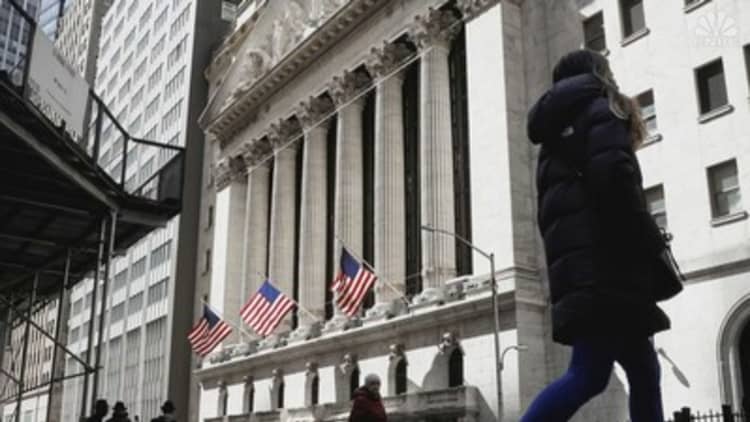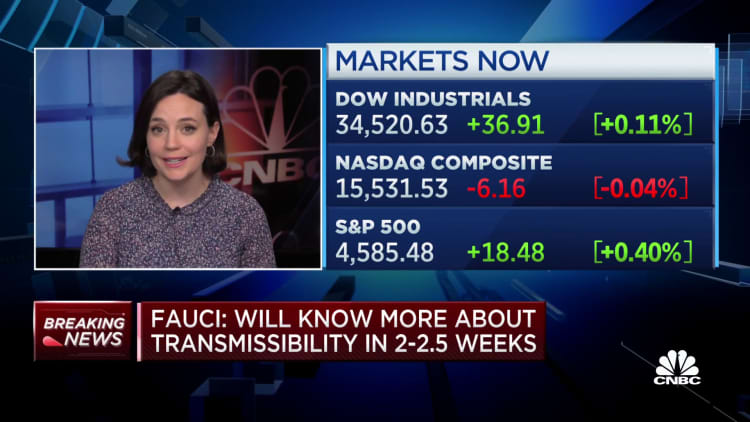
The major averages fell sharply, giving up solid gains, on Wednesday after the Centers for Disease Control and Prevention confirmed the first case of omicron in the U.S.
The Dow Jones Industrial Average fell 461.68 points to 34,022.04, after being up more than 520 points at the high of the day. The S&P 500 lost nearly 1.2% to end at 4,513.04. The broad-market index closed below its 50-day moving average for the first time since Oct. 13. The Nasdaq Composite dropped 1.8% to 15,254.05 after rising as much as 1.8% earlier in the session
Wednesday's moves continue a volatile streak of the last four sessions as the omicron threat emerged.
Stocks' reversal came after the CDC reported the country's first case of the new, heavily mutated coronavirus variant called omicron in California. Omicron — first detected last week in South Africa — has been reported in at least 23 countries, according to the World Health Organization.
Travel stocks were the biggest losers following news of the first case on U.S. shores. American Airlines fell nearly 8%, Delta Air Lines dropped 7.3%, and United Airlines slipped 7.5%. Aerospace manufacturer Boeing lost 4.8%.
Norwegian Cruise Line Holdings and Carnival got hit by 8.8% and 7%, respectively. Wynn Resorts fell 6.1% and Hilton Worldwide ended the day about 3.8% lower.
Retailers also took hits on Wednesday. Nordstrom closed down 5.3% and Kohl's lost 5.6%. Best Buy and Macy's dropped 4.3% and 4.6%, respectively.

The small-cap benchmark Russell 2000, full of economically sensitive names, lost 2.3% on Wednesday.
"It feels as though the market was wondering when, not if there was going to be this new variant on our shores," said Art Hogan, National Securities chief market strategist. However, he isn't concerned yet about the market impact of omicron.
"I think we're at a place now where we understand there's a diminishing impact with new waves and new variants with this virus," Hogan said.
Steve Massocca of Wedbush Securities added that some of the selling has been related to tax-loss selling and that will continue.
"I think a lot of it is tax-loss selling. I think a lot of the poor names are doing worse because people are taking tax losses because they have so many gains elsewhere," he said.
The newfound threat to the recovery from the pandemic, which caused several travel bans, is intensified by the Federal Reserve mulling a quicker-than-planned exit from its easy monetary policy.
Fed Chairman Jerome Powell jolted markets on Tuesday after he said the central bank is expected to discuss speeding up the taper of its minimum $120 billion a month bond-buying program. Despite the potential disruption of omicron, the Fed chief said he thinks reducing the pace of monthly bond buys can move quicker than the $15 billion-a-month schedule announced earlier this month. Powell's comments left the Dow down more than 650 points on Tuesday.
"I think that the taper need not be a disruptive event in markets. I don't expect that it will be. It hasn't been so far. We've telegraphed it," Powell said during Congressional testimony on Wednesday.
The U.S. 10-year Treasury rose as much as 9 basis points to around 1.5% earlier in the session on Wednesday but later retreated to around 1.41%.
The major averages have seen several volatile sessions, starting last Friday when the Dow experienced its worst day since October 2020. Stocks rebounded on Monday, only to turn downward again on Tuesday.
This week, the Dow is down 2.5% and the S&P 500 has lost nearly 1.8%. The Nasdaq Composite is down 1.5% since Monday.
On the data front, ADP's private payroll data for November showed 534,000 jobs added that month, above expectations of 506,000.
Elsewhere, November's IHS Markit manufacturing PMI came in at 58.3, lower than expected. October construction spending also rose slower than expected, but there was a positive historical revision to help offset the miss.
The November manufacturing report from ISM, which matched expectations and showed a decline in prices paid.
Stocks wrapped up a volatile month of trading on Tuesday. The Dow lost 3.7% for its second month of losses in three. The S&P 500 fell 0.8%, while the Nasdaq Composite gained 0.25% in November. The Russell 2000 shed 4.3% in November, its worst month since March 2020.
Still, the major averages are up solidly for the year. The Dow is up 11.1% and the S&P 500 is up nearly 20.2% in 2021. The Nasdaq Composite is up about 18.4% this year.
— with reporting from CNBC's Patti Domm and Jeff Cox.



